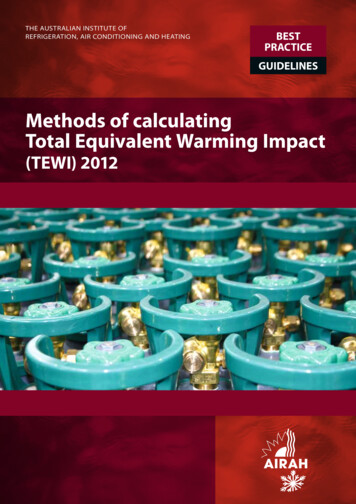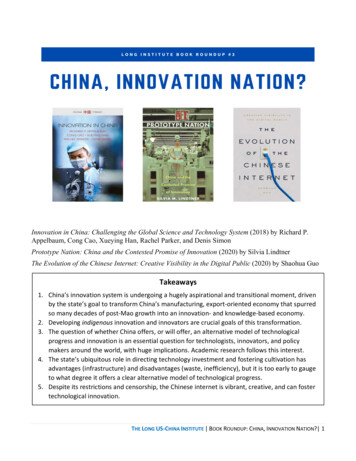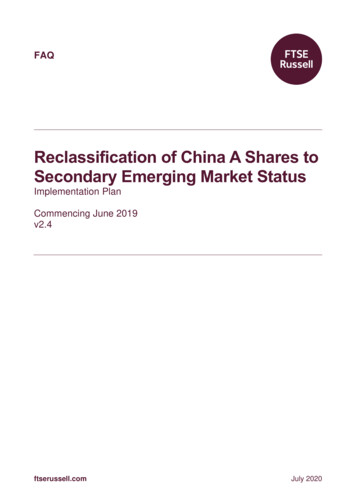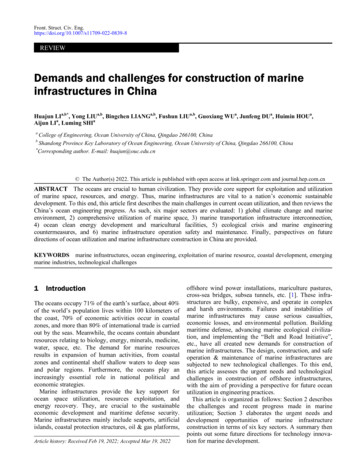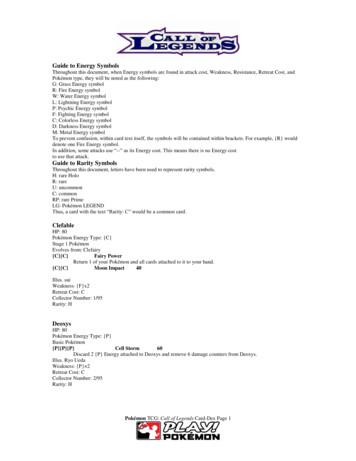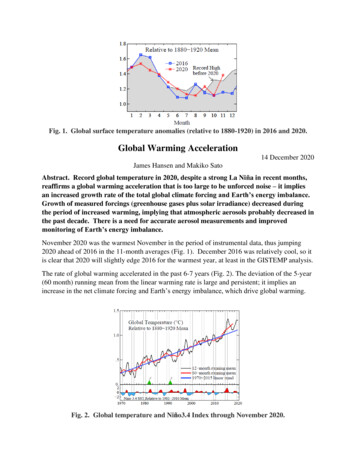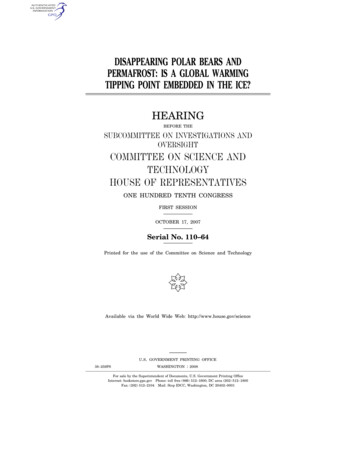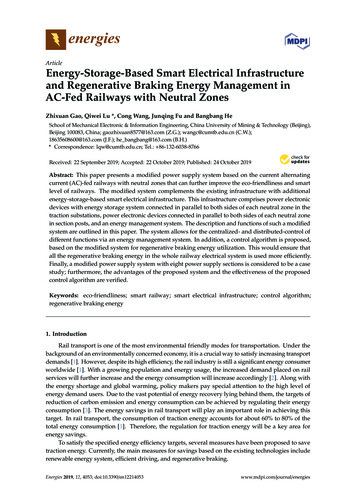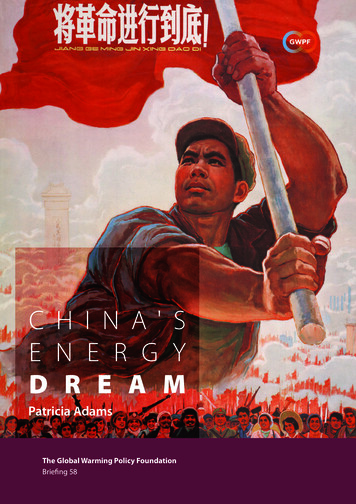
Transcription
C H I N A' SE N E R G YD R E A MPatricia AdamsThe Global Warming Policy FoundationBriefing 58
China's Energy DreamPatricia AdamsBriefing 58, The Global Warming Policy Foundation Copyright 2021, The Global Warming Policy FoundationAll images CC licence, Mark Gayn Collection, Thomas Fisher Rare Book Library, University of TorontoAbout the authorPatricia Adams is an economist and the executive director of Probe International, a Toronto-basedNGO that has been involved in the Chinese environmental movement since its beginnings in themid-1980s through the publication of books such as Damming the Three Gorges and Three GorgesProbe, a news portal published in English and Chinese. As editor of the English language translation of Yangtze! Yangtze!, the book that helped inspire China’s democracy movement, and as anauthor and contributor to books and journals on China’s environmental crises, she is an authorityon China’s environmental policy. Ms Adams, a founder of the World Rainforest Movement and theInternational Rivers Network, has testified before Congressional and Parliamentary Committeesin the US and Canada, and has often appeared in major media, including the BBC, CBC, NPR, ABC,New York Times, Wall Street Journal, the Globe and Mail and National Post.
ContentsAbout the author iiExecutive summary iiiIntroduction 1War without fighting 2China’s Achilles' heel 8Protecting access to fossil fuels 11Conclusion 11Notes 14About the Global Warming Policy Foundation 22Executive summary China’s insistence at COP 26 on language that endorsed continued fossil fuel use has its rootsin two urgent needs. Firstly, without coal, oil, and gas, China’s economy would decline, discrediting the legitimacy of communist rule. Just as important, without fossil fuels Chinese president XiJinping would be unable to reach his overarching goal – to make China the world’s supreme powerby the year 2049, the centennial of the founding of the People’s Republic of China. China uses the climate agenda both as a way to strengthen its economy and as a weapon forweakening other countries. It now monopolises the global wind and solar industries, although itsown renewable energy infrastructure, as everywhere, is unreliable (and therefore requires thermalgeneration backup), costly, and subject to high rates of curtailment. But its domestic renewablessites serve as effective demonstration projects for tours by Western environmentalists, who thenlobby their governments to buy these expensive and unreliable forms of energy. When they do, itgives China two wins for the West’s two losses. On the same model of profiting from the sale to the West of crippling technologies, Chinahopes to dominate the electric vehicle market. By pursuing unilateral climate policies, Western countries are hobbling their economies throughrising energy costs, power blackouts and other supply shortages as surely as wartime saboteursmight, only the damage is self-inflicted and systemwide. No weapon is more potent at cripplingWestern economies than the net zero agenda. China’s army here includes western environmentalNGOs and media, who together give naïve politicians their marching orders. For the Communist regime to survive, and that is surely the CCP’s top priority, fossil fuels foreconomic growth must be secure, explaining why all the state’s resources are rallied to the task. The pursuit of CO2 reductions within China would serve neither the goal of preserving Communist rule nor becoming the world’s foremost superpower by 2049. To China’s leadership, it is ano-brainer. As far as the CCP is concerned, carbon dioxide reductions only make sense for those itwishes to harm and supplant.iii
IntroductionThe COP 26 climate change summit in Glasgow, in November2021, was designed to get 190 world leaders to make pledges tocut carbon dioxide emissions and save the planet. The main targetwas coal, which is responsible for 42 per cent of the world’s carbon dioxide emissions and is far more polluting than alternativeenergy sources, including other fossil fuels.1 But at the eleventhhour, India and China, the world’s largest consumers, demandeda change to the text of the agreement. Without the fig leaf of support from Beijing, in particular, the pretence of climate negotiations would be over. The COP 26 summit therefore caved, and thelanguage changed, from an urgent commitment to ‘phase out’ theuse of coal power, to ‘phase down’, suggesting a slow-walk in reductions that would allow continued use of coal indefinitely.China’s insistence on language that endorsed continued fossil fuel use has its roots in two urgent needs. Firstly, without coal,oil, and gas, its economy would underperform, discrediting thelegitimacy of communist rule.2 Just as important, without fossilfuels, Chinese president Xi Jinping would be unable to reach hisoverarching goal – to make China the world’s supreme power bythe year 2049, the centennial of the founding of the People’s Republic of China.In 2012, Xi announced that his nation would embark on a‘Great Rejuvenation’3 project, during his first speech as president.Using the language of his imperial ancestors, he declared an aimto restore China’s position as a world superpower. As the Chineseover the centuries have understood, under the notion of Tianxia,or the ‘Mandate of Heaven’,4 China’s ruler has a divine right – somewould say is compelled – to rule through a world government.That mandate was interrupted by a century of national humiliation at the hands of the Western powers and Japan, who subjugated the Qing dynasty and the Republic of China from 1839 to1949. An exhibit at the Chinese National Museum in Beijing describes that period as one in which ‘the imperial powers descended on China like a swarm of bees, looting our treasures and killingour people’.5To reverse this humiliation, President Xi has created detailedplans for every part of the economy and national life, ‘from spaceto seabed’.6 Under propagandistic programs such as The ChinaDream7, Made in China 2025,8 and now Common Prosperity,9 theso-called ‘China Model‘10 for innovation, governance, and militarydevelopment would see China replace the US as the world’s superpower. In July 2021, on the centenary of the Chinese Communist Party's founding, Xi donned a Mao suit and, in a fiery speechto an audience of 70,000, thundered that:The Chinese people will never allow any foreign forces to bully,coerce and enslave us. Whoever attempts to do that, will surelycrack their heads and spill blood on the steel Great Wall builtwith the blood and flesh of 1.4 billion Chinese.111
War without fightingAlthough much is made of the rapid rate at which China is militarising – it already has the world’s largest army and navy12 – to theChinese way of thinking, delivering global pre-eminence throughmilitary victory on the battlefield would represent an inelegantsecond best. As the legendary Chinese general and author of TheArt of War, Sun Tzu, said, ‘The greatest victory is that which requiresno battle’.13 To meet this ideal, President Xi has been working totake over the world without firing a single shot. China’s many contradictory positions on climate change are best understood in thiscontext.Subverting international institutionsChina’s bulletless war is based on Sun Tzu’s maxim that ‘All warfareis based on deception’. Recent history attests to the West’s inclination to be deceived. In one Cold War theatre – multilateral organisations – the West lulled itself into believing that an engagedChina would become a liberal democracy, while Beijing busied itself subverting the institutions in order to entrench and further itstotalitarianism.For example, at the UN, China has acquired leadership positions by buying votes from poor countries. To instal Beijing’svice-minister for agriculture, Qu Dongyu, as Director General ofthe Food and Agriculture Organization (FAO), the UN’s biggesttechnical agency, China is believed to have bribed Cameroon towithdraw its candidate by slashing 78 million in Cameroon-government debt.14 Referring to Beijing’s strategic grip over UN agencies, US ambassador to the UN Linda Thomas-Greenfield told theHouse Foreign Affairs Committee, ‘They exert enormous influencein the United Nations, and it’s malign [it is an] influence that promotes an authoritarian approach to multilateralism’.15The co-chair16 of the working group of the UN Intergovernmental Panel on Climate Change (IPCC), which in August 2021produced a 4000-page document17 declaring the need for ‘strong,rapid, and sustained reductions in greenhouse gas [GHG] emissions, and reaching net-zero CO2 emissions’,18 is an appointee ofthe Chinese Communist Party. Three of the 15 UN specialisedagencies are headed by Chinese nationals, including the FAO, theInternational Telecommunication Union (ITU), and the UN Industrial Development Organization (UNIDP). Since 2007, the positionof under-secretary-general for the UN Department of Economicand Social Affairs (DESA) has been held by Chinese career diplomats, giving Beijing opportunities to reshape the UN’s development programs in accordance with its interests.19In addition, China has taken over the UN Office for the HighCommissioner for Human Rights and the UN Human Rights Council.20 While pressuring countries and companies to subscribe to anauthoritarian alternative to the UN’s international human rightssystem, Chinese envoys are simultaneously working from withinthat system to hollow it out, most directly by redefining human2
rights as ‘a right to development’, rather than as universal rightsof individuals that must be upheld by governments.21 ‘Only withgreater development can human rights be better promoted’, saidChen Xu, China’s ambassador in Geneva, in July.22In its recent report, the UK House of Commons Foreign Affairs Committee23 called this ‘creeping capture of organisationsby China’ and its autocratic state allies ‘malign’. It accused Chinaof using its economic leverage and aggressive diplomacy ‘to coerce states to back their position or their candidates, and then useorganisations, such as the World Health Organization, the WorldTrade Organization (WTO), the UN Office for the High Commissioner for Human Rights and the UN Human Rights Council, theInternational Criminal Court and the Organisation for Security andCooperation in Europe, ‘to shift policies away from the cooperation the organisations were created to promote’. These diplomaticcoups led the UK House of Commons Foreign Affairs Committeechair, Tom Tugendhat, to warn that ‘Dictatorships are taking overthe institutions built out of the wreckage of the Second World Warto defend democracy’.24Interpol was an especially valuable capture for China, since itallows the CCP to use Interpol’s international arrest-warrant system and a variety of extra-legal means to hunt down the CCP’soverseas political enemies, whistleblowers, and potentially evendissidents.25Extending its reachChina has long been expanding its territorial reach in what mightseem unlikely areas. It joined the Antarctic Treaty in 1985 withpromises to protect the South Pole, but according to Australianobservers, ‘China has conducted undeclared military activitiesin Antarctica, is building up the case for a territorial claim, and isengaging in minerals exploration’, all activities that are expresslyforbidden by the Antarctic Treaty.26 Former White House NationalSecurity Advisor Robert C. O’Brien was not surprised, ‘as we haveseen in Hong Kong, the South China Sea, cyber economic espionage, and in trade, the Chinese Communist Party willfully disregards international agreements when it is convenient to do so’.27In the opposite polar region, China is lobbying hard to become a‘near Arctic state’ in the Arctic Council, an intergovernmental forumestablished by the eight Arctic states with the goal of promotingcooperation in the Arctic. Here China is playing the environmentand good governance card, calling for an ‘Ice Silk Road’ frameworkthat could ‘represent a new direction for future Arctic governanceand cooperation’ to control decisions concerning shipping andenergy developments.28 As Chinese maritime specialist Shi Chunlin wrote in 2010, ‘The Arctic sea route is a strategic military route;whoever controls the Arctic will have the upper hand over otheropponents’.29Joseph Bosco, former China country director for the US Secretary of Defense, points out that China continues its successfulgray-zone expansionism in the South China Sea, East China Sea3
and Taiwan Strait. ‘While modulating its activities to evade a significant Western response, Beijing is creating facts on the ground,on the ocean, and in the air in each of the region’s hot spots’, hesays. What might start out as an apparent temporary or transitory infringement ‘could easily morph into a permanent Chinesepresence that could be broken only by overt military action thatwould then trigger a full-fledged Chinese military response’. China’s neighbours might then stand down, for fear of being perceived the aggressor. ‘As both Sun Tzu and communist doctrineinstruct, China would then “win without fighting”.’30Emboldened by his South China Sea successes, Xi is replicating that model in the Himalayas, aggressively building newvillages and military facilities in disputed borderlands. The aim is‘to extend or consolidate its control over strategically importantareas that India, Bhutan, and Nepal maintain fall within their national boundaries’, says Brahma Chellaney, a geostrategist withIndia’s Centre for Policy Research, who adds:The new installations range from electronic warfare stationsand air defense sites to underground ammunition depots This approach blends conventional and irregular tactics withsmall incremental territorial encroachments (or ‘salami slicing’),psychological manipulation, disinformation, lawfare, and coercive diplomacy.31China also uses its control of much of the Himalayan plateauas a weapon against its neighbours. By building cascades of largedams on international rivers just before they leave its territory,China is re-engineering cross-border natural flows and giving it athrottlehold on the headwaters of Asia’s major river systems. It isusing ‘the water tower of Asia’, as Tibet is known, to bargain withor threaten many Asian nations. Ten major Asian rivers, including the Indus, Sutlej, Brahmaputra, Irrawaddy, Salween, Yellow,Yangtze and Mekong originate in Tibet and flow through China,India, Bangladesh, Nepal, Bhutan, Pakistan, Vietnam, Thailand,Burma, Cambodia and Laos. These rivers are the lifeline of sometwo billion people in South and Southeast Asia’.32 Incidents offlash water releases and unannounced holdbacks have alreadyblindsided downstream countries, demonstrating that China hasthe power to weaponise the region’s fresh water supplies.33The centrality of the economic theatreHowever, the economy – within which energy and climate policies fall – is arguably the most important theatre in which China’sstruggle for world domination is being fought. A decade ago,Colonel Liu, a professor at the National Defense University – anelite academy tasked with training senior officers in the People'sLiberation Army – endorsed the strategy of developing economicprowess in aid of military goals. He urged China to replace the USas the top global player by building its economy into the world’sbiggest and complementing it with a formidable military.34China’s route to industrial supremacy has rarely followed le4
gitimate paths. It joined the WTO in 2001 with promises to follow fairtrade rules, but then systematically violated them, using high tariffs andnon-tariff barriers to protect home industries, constantly changing regulations, closing markets to foreigners, purloining key technologies andintellectual property through cyberespionage, physical theft and forcedtechnology transfer, forcing joint ventures with Chinese companies, andsubsidising the exports of government-owned ‘national champions’.The subsidies, whether achieved through direct financial transfers, byignoring environmental and health and safety standards, or by makingcheap loans to manufacturers, crushed China’s free-market competitors,wiping out once-diversified global markets in steel, railway, pharmaceuticals, rare-earth minerals, and green technologies such as wind and solar.35As part of the same strategy, China preyed on weak countries, locking up their natural resources with ‘debt traps’ to gain a global stranglehold on key resources such as bauxite, copper, nickel,36 and lithium.37China now dominates industries from ship production and refrigeratorsto colour TV sets, air conditioners, and computers, and has become theglobe’s second largest economy.38China also employs methods to hurt Western economies directly.Through cyberwarfare, it aims to defeat the West psychologically byreminding us that it has the power to control our economies and governance. 39 According to the National Security Agency, the FBI and theUS Cybersecurity and Infrastructure Security Agency, China’s prolific, effective, and malicious cyberespionage activities, which target political,economic, military and educational institutions, as well as critical infrastructure, present a major threat to the US and its allies.40 National Security Agency officials warned the Congressional House Intelligence Committee as far back as 201441 that China and ‘probably one or two other’countries have the capacity to shut down the nation’s power grid42 andother critical infrastructure through a cyberattack.As one example of the routine cyber costs that Western industriesface, in March 2021, China’s Ministry of State Security (MSS) launched amassive cyberattack on Microsoft Exchange email servers.43 The attackwas carried out by criminal contract hackers working for the MSS whoalso engage in cyber-enabled extortion, cryptojacking and ransomware. Their digital assaults, which have been going on for years, havecost ‘governments and businesses billions of dollars in stolen intellectual property, ransom payments and cybersecurity mitigation efforts’,noted Secretary of State Antony Blinken.44Climate policy as a weaponChina uses climate policy both as a way to strengthen its economy andas a weapon for weakening other countries. It now monopolises thewind and solar industries, although its own green power infrastructure,as everywhere, is unreliable (and therefore requires thermal generationbackup), costly, and subject to high rates of curtailment.45 But its domestic renewables sites do serve as effective demonstration projects fortours by Western environmentalists, who then lobby Western nationsto buy these expensive and unreliable forms of energy. When they do,it gives China two wins for the West’s two losses. On the same model6
of profiting from the sale to the West of crippling technologies, Chinahopes to dominate the electric vehicle market.Conventional war is a zero-sum activity, in which reducing the enemy’s military capabilities is as beneficial as increasing one’s own. Thislogic also applies to a Cold War, particularly for a communist countrythat sees economic competition as a zero-sum game. From China’s perspective, to win the economic war, bringing the enemy’s economy downis as worthwhile an endeavour as augmenting one’s own.While cyberwarfare attacks an economy by stealth, climate changepolicies do so in plain sight. No better example exists of China’s execution of Sun Tzu’s maxim: ‘The opportunity to secure ourselves againstdefeat lies in our own hands, but the opportunity of defeating the enemy is provided by the enemy himself’.46 By pursuing climate policies,Western countries are hobbling their economies through power blackouts and other supply shortages as surely as wartime saboteurs might,only the damage is self-inflicted and system-wide. No weapon is morepotent at crippling Western economies than climate change. China’sarmy here includes western environmental NGOs and media, who together give the politicians their marching orders.47There is no doubt that this approach is working. The current attempts to implement a Green New Deal, a sweeping remake of Americathat, it is alleged, ‘will convert the old, gray economy into a new, sustainable economy that is environmentally sound, economically viableand socially responsible’,48 would cost the US economy some 9 trillionper year in GDP, according to an estimate from the American EnterpriseInstitute.49 Given that the total US GDP is about 21 trillion, if ever itwas comprehensively attempted, a Green New Deal would cripple theeconomy. The climate portion of the project alone could cost up to 12trillion over a decade.50In Texas, where state mandates and federal subsidies have madewind the second largest source of electricity, power became unreliableand outright failed during a cold snap in February 2021. As the coldweather worsened, half the state’s wind generation sat frozen and immobile. While wind provided 42% of the state’s electricity on February 7,it fell to 8% on February 11. In contrast:[E]ven though the extreme cold had frozen cooling systems on coalplants and natural gas pipelines, the state’s coal plants still upped theiroutput by 47% in response to increasing demand. Natural gas plantsacross the state increased their output by an amazing 450%. Fossil fuels have done yeoman’s work to make up for wind’s reliable unreliability.51The experience elsewhere in the West has also been ruinous. In Germany, the plan to shift from fossil fuels to renewable energy by midcentury –the Energiewende – was projected by one of the FraunhoferInstitutes to cost about 1.1 trillion.52 With rising energy costs, manufacturers have begun to leave Germany for the US, where climate changepolicies are more talk and less action.In the UK, the 368-page plan to turn Britain green by 2050, NetZero Strategy: Build Back Greener, has a price tag of at least 3 trillion.53Onward, a think tank, estimated that delivering Net Zero by 2025 would7
require 270,000 more plumbers, three times the number currentlyworking in Britain, to replace gas boilers with low-carbon alternativessuch as electric heat pumps. Professor Michael Kelly estimates that theadditional workforce required to deliver retrofitted insulation to theUK housing stock would be equivalent in size to that working in theNHS.54China is doing everything it can to encourage the West to continue its pursuit of climate reforms. Moreover, it promises to do its parttoo, going as far as to assume a leadership role. At the 76th session ofthe UN General Assembly, on 21 September 2021, Xi Jinping stressedthe importance of improving global environmental governance, actively responding to climate change and creating ‘a community oflife for man and nature’. In China’s dealings with other developingcountries, he pledged to stop building new coal-fired power projectsin favour of developing green and low-carbon energy. Domestically,he promised to accelerate the transition to a green and low-carboneconomy, to reach carbon neutrality. ‘China will strive to peak carbondioxide emissions before 2030 and achieve carbon neutrality before2060. This requires tremendous hard work, and we will make every effort to meet these goals’, he said.55In reality, these are just platitudes, as the events at COP 26 madeclear: western leaders acted true to form, issuing pledges to reduceCO2 emissions and signing declarations to signal their virtue, all thewhile accepting China’s refusal to do so. To the Chinese, the West’sgullibility confirms their view of themselves as an inherently superiorrace. President Xi’s rhetoric aside, his plan is clear. China is going allout, domestically and internationally, to secure more and more fossilfuels to drive its economy and achieve world superpower supremacy.China’s Achilles' heelCoal and the CCP’s grip on powerAs noted in the Introduction, cheap reliable energy is necessary tokeep the Communist Party in power. So when crippling energy shortages hit China in 2021, Premier Li Keqiang took to the airwaves andordered the country’s top state-owned energy companies – from coalto electricity and oil – to secure supplies for the winter at all costs.Chinese officials ordered more than 70 mines in Inner Mongolia toramp up coal production by nearly 100 million tonnes and revivedothers that had been mothballed.56 ‘We must rectify the local, non-discretionary implementation of power restrictions, production cuts orcampaign-like carbon reductions, to ensure a warm winter for peoplein the northern regions, [while] guaranteeing the stability of industrialchains and the steady development of the national economy’, Li said.57Carbon peaking and neutrality is all very well, said Li to the official Xinhua newsagency, but ‘require long-term hard work’. In themeantime, ‘[d]evelopment remains the key to all of the problems[China is facing], while the supply shortage is now the biggest energyinsecurity’.58 Translated, he meant that energy security is regime protection and trumps all else.8
9
By mid-November 2021, China’s energy crisis was over, thanks tothe magic hand of the central planners. ‘China has worked to boostcoal production and bring coal prices back to a reasonable range’,Meng Wei, spokesperson for the National Development and ReformCommission, told a press conference. Coal stockpiles at the country’spower producers have rebounded, and production of natural gas toensure adequate supplies has been ‘cranked up‘ said state news agency, Xinhua.59As these events, and the outcome at COP 26 make clear, Beijing isnot about to abandon coal, its most secure form of energy. In 2020, itaccounted for 57 per cent of China's total energy consumption.60 Lastyear, its 38.4 gigawatts of new coal-fired power stations was more thanthree times the new capacity built in the rest of the world.61 Another247 gigawatts is being planned or developed, with more to follow.62Last year, Chinese provinces granted construction approval to 47gigawatts of coal power projects, more than three times the capacity permitted in 2019. As for CO2 emissions, steel, cement, and heavymanufacturing, predominantly backed by coal power, boosted China’scarbon dioxide emissions by 4 percent in the second half of 2020 compared to the same (pre-pandemic) period the year before. 63The long supply lines for oil and gasIf fossil fuels are indispensable for maintaining the CCP’s grip on powerat home, they are also vital for Xi’s plans for world domination. China’sAchilles' heel is its dependence on foreign sources for its oil and gas,a vulnerability that the country’s super-planning agency, the NationalDevelopment and Reform Commission, recently admitted for the firsttime.64 In its 2020 annual report65 to China’s official decision-makingbody, the National People’s Congress, the commission barely mentioned climate change, instead pledging to ‘ensure energy security’ to‘improve our contingency plans in response to major changes in supply and demand at home and abroad’.66The 2021 report, delivered to the People’s Congress on 5 March,again gave short shrift to climate change, promising only what theWest’s environmental NGOs at the time decried as ‘baby steps’ towardsdecarbonisation.67 China’s focus instead was on the priority of securingenergy supplies and its consequent determination to: promote the development of energy transportation routes,strengthen our energy reserve capacity, and improve transportationservices. We will refine energy contingency plans, improve our riskand emergency response capabilities, and strengthen energy security and resilience.The planning and reform commission concluded by promising to‘boost oil and gas exploration and development’ and ‘systematically increase our ability to ensure the supply of coal’.68China’s dependence on foreigners for its oil – more evident thanever from its stance at COP 26 – has grown steadily. In 2008, its dependence on foreign oil reached 50 per cent for the first time. Last year,it was 73 per cent. The trend is especially worrying to China because,while its oil imports increased by 7.3 per cent last year, its domestic10
production inched up a mere 1.6 per cent. Despite its drive for selfsufficiency, Chinese production since 2017 has stalled at 3.8–3.9 million barrels per day.69Moreover, most of its oil and gas imports pass through chokeholds: in the South China Sea, the Strait of Hormuz and especially theStrait of Malacca, which connects the Indian Ocean to the Pacific, andthrough which roughly 80 per cent of its imported oil transits. Thesesea lanes are all controlled by other states, making its position precarious in the event of possible conflicts with Taiwan, Japan, India, or theUS.70Protecting access to fossil fuelsChina is well aware of the risks to its strategy for world domination,and it is taking a dizzying variety of steps to secure its supply of fossilfuels. In the South China Seas, its navy protects both oil and gas tankerroutes into its ports and the far-flung offshore oil and gas resources it isclaiming.71 It has also been willing to risk US sanctions by surreptitiously purchasing Iranian oil.72 Meanwhile, to minimise its vulnerability tointerruptions at sea, it has also been aggressively developing overlandoil and gas routes: from Russia,73 from Burma,74 and from Turkmenistan,Uzbekistan, and Kazakhstan, with these Central Asian sources feeding pipelines ending in Xinjiang, China’s far-western Muslim province,whose Uighur population it sees as a security threat.75The extent to which China recognises its future will be in fossil fuels can also be seen in its vast long-term investments to secure suppliers and delivery routes for its oil deliveries. China now has a permanent People’s Liberation Army (PLA) naval base in Djibouti on theHorn of Africa. This, its first overseas naval base, gives it the capacityto undertake and sustain missions geared toward protecting strategicsea lanes. T
Art of War, Sun Tzu, said, 'The greatest victory is that which requires no battle'.13 To meet this ideal, President Xi has been working to take over the world without firing a single shot. China's many con - tradictory positions on climate change are best understood in this context. Subverting international institutions


